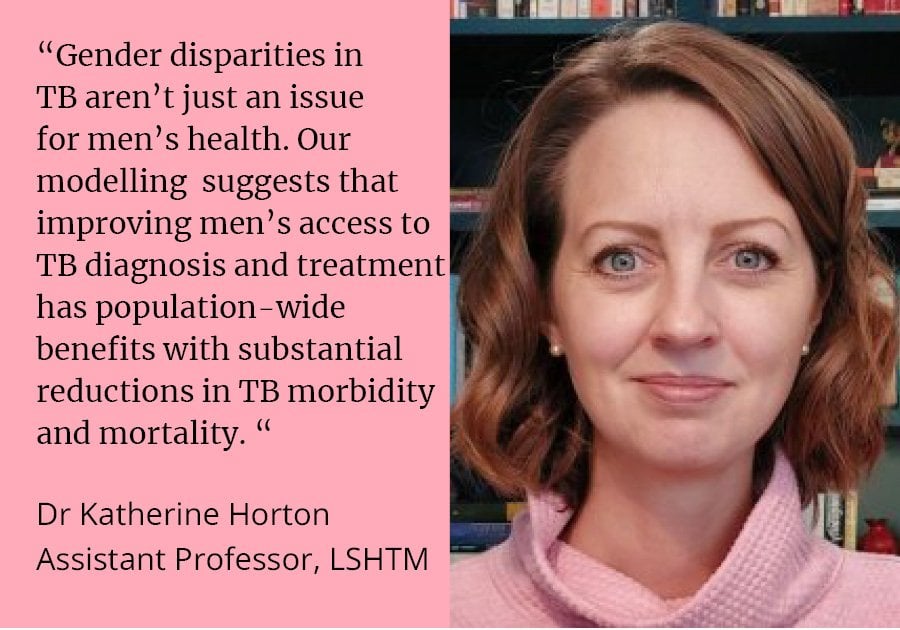
Could you describe your research focus when it comes to better understanding tuberculosis?
With colleagues at LSHTM and across The LIGHT Consortium, I have worked to quantify and understand gender disparities in the burden of TB disease, in access to diagnosis and treatment, and in treatment outcomes - and what impact those disparities have across populations. We use mathematical modelling as a tool to estimate the potential population-wide impact of strategies to address gender inequalities in TB burden and care.
Does TB affect women and men differently?
The World Health Organization (WHO) reports more new cases of TB among men than women each year, and we reviewed national and sub-national surveys of TB prevalence and found that the number of men with undiagnosed TB is more than twice the number of women with undiagnosed TB. There are many reasons for men’s increased burden of TB that include individual, social, and structural determinants, with most of these grounded in gender norms and expectations. Of the five key TB determinants highlighted by the WHO in their most recent report on TB, three – diabetes, tobacco smoking, and harmful alcohol consumption – disproportionately affect men. Men also account for a majority of at least three of the five specific TB key populations identified by the Stop TB Partnership – miners, prisoners and detainees, and people who use drugs.
Do men access care for TB infections differently compared to women?
Unfortunately, men's disadvantages in TB extend to care. In most settings, men have less access to timely TB diagnosis and treatment than women, so the potential benefits of prevention and care remain outside their reach. Even among those who are able to access care, we find that men have a higher risk of treatment failure, disease recurrence, and death.
Again, gender plays a key role. Men are often expected to be self-reliant, stoic, strong, etc., which conflicts with admissions of illness and care-seeking behaviours. Men are also expected to fulfil roles as leaders and providers for their families and so often cite financial and work-related barriers to care, particularly in the absence of formal work and social protections.
What are some recommendations for targeting men specifically when it comes to detection and treatment of TB?
We know that men have very little engagement with healthcare facilities, so we always come back to the idea of meeting men where they are, whether at work, at transport hubs, at men’s only health facilities, at leisure settings. Through The LIGHT Consortium, we're working with partners in Nigeria, Kenya, Malawi, Uganda, and the UK to generate evidence on gender-responsive strategies in community, health care, and youth sectors.
Do your models suggest that a targeted approach for testing and treating men for and with TB would have an overall impact on reducing TB infections?
Yes! Our modelling work suggests that improving men's access to TB diagnosis and treatment has population-wide benefits and will lead to substantial reductions in TB morbidity and mortality, not only in men, but also in women and in children.
Gender disparities in TB aren't just an issue for men's health. In addition to contributing to onward transmission, the high burden of undiagnosed TB among men also results in millions of women taking on additional caring responsibilities, millions of households facing economic pressure and catastrophic costs, and millions of families being stigmatised and excluded from their communities. Men's disadvantages in TB burden and care are an issue for everyone.
Our postgraduate taught courses provide health practitioners, clinicians, policy-makers, scientists and recent graduates with a world-class qualification in public and global health.
If you are coming to LSHTM to study a distance learning programme (PG Cert, PG Dip, MSc or individual modules) starting in 2024, you may be eligible for a 5% discount on your tuition fees.
These fee reduction schemes are available for a limited time only.
